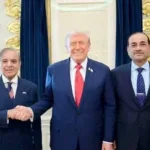
Pakistani singer Asim Azhar has left fans puzzled after deleting all pictures and posts from his Instagram account, sparking speculation about the reason behind the sudden move.
The singer wiped his feed clean just minutes after sharing an emotional message on his Instagram Story, which read “Allah Hafiz.” The message immediately caught fans’ attention, but upon checking, they found his profile completely empty.
The move came shortly after Azhar’s live performance in Islamabad, where he had expressed disappointment with the organisers over the show’s delay.
This isn’t the first time the singer has taken such a step. In 2024, ahead of the release of his album “Bematlab,” Azhar had similarly deleted all his Instagram posts — a move that later turned out to be a marketing strategy.

Following the latest incident, fans are now speculating that his “Khuda Hafiz” post could be a teaser for a new album or project, with social media buzzing about the singer’s next move.
Earlier, Azhar was also spotted celebrating actor Yashma Gill’s birthday alongside Hania Aamir, where the trio was seen enjoying music and dancing to the beats of Pal Pal.
Discover more from Brackly News
Subscribe to get the latest posts sent to your email.



